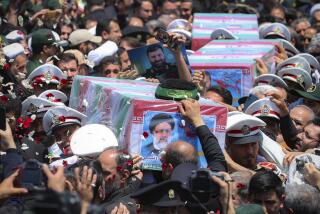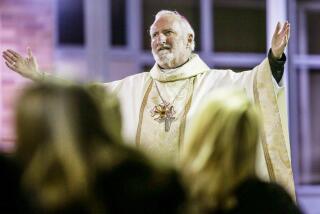Worshipers in the Southland Mourn Loss of Shiite Leader
- Share via
The slaying of Ayatollah Mohammed Bakr Hakim brought anguish, anger and shock Friday to Shiite Muslim leaders in Southern California.
At the Islamic Educational Center of Orange County in Costa Mesa, Imam Moustafa Al-Qazwini said he delivered a Friday prayer sermon on Hakim’s life to about 300 people. Some of them, he said, were weeping and clad in black mourning robes.
“It’s a huge tragedy for us and a big loss for all Iraqis,” Al-Qazwini said, adding that Hakim had distinguished himself through his combination of religious knowledge and moderate political leadership. “We expected him to play an important role in bringing peace and security to postwar Iraq.”
Basam Ridha Alhussaini, West Coast representative of Hakim’s Supreme Council for Islamic Revolution in Iraq, said he was awakened at 5 a.m. Friday with a call from Baghdad informing him of the attack. He said he spent the morning in tears, scouring for news of the killing on satellite television channels and trying, unsuccessfully, to reach friends in Najaf, where the attack occurred outside a mosque.
Alhussaini said he lost not only his ayatollah in the attack, but also a childhood friend and neighbor who served as Hakim’s bodyguard.
A memorial service for Hakim is scheduled for Sunday evening at Ahul Bayt Mosque in Pomona.
Both Al-Qazwini and Alhussaini speculated that the killing was the work of forces loyal to Saddam Hussein, possibly in concert with Al Qaeda.
Despite recent reports of growing clashes between Shiite factions for control of Iraq, the two Southern California leaders insisted that no Shiite would ever kill a prominent Shiite leader at such a holy site as Imam Ali Mosque.
Both men also criticized the U.S.-led forces in Iraq for failing to secure the mosque. Alhussaini went a step further, calling for rearming the Supreme Council’s private force, the Badr Brigade. U.S. troops disarmed that force earlier this year, despite requests from Hakim to allow them to continue to protect him, according to Alhussaini.
“The coalition forces are doing a very poor job protecting their own soldiers and our leaders,” he said. “They need to trust the Shias more and allow the Badr troops to rearm and provide security for our own religious sites and offices.”
Al-Qazwini disagreed. Splintered security forces, he said, would further divide Iraq.
More to Read
Sign up for Essential California
The most important California stories and recommendations in your inbox every morning.
You may occasionally receive promotional content from the Los Angeles Times.











